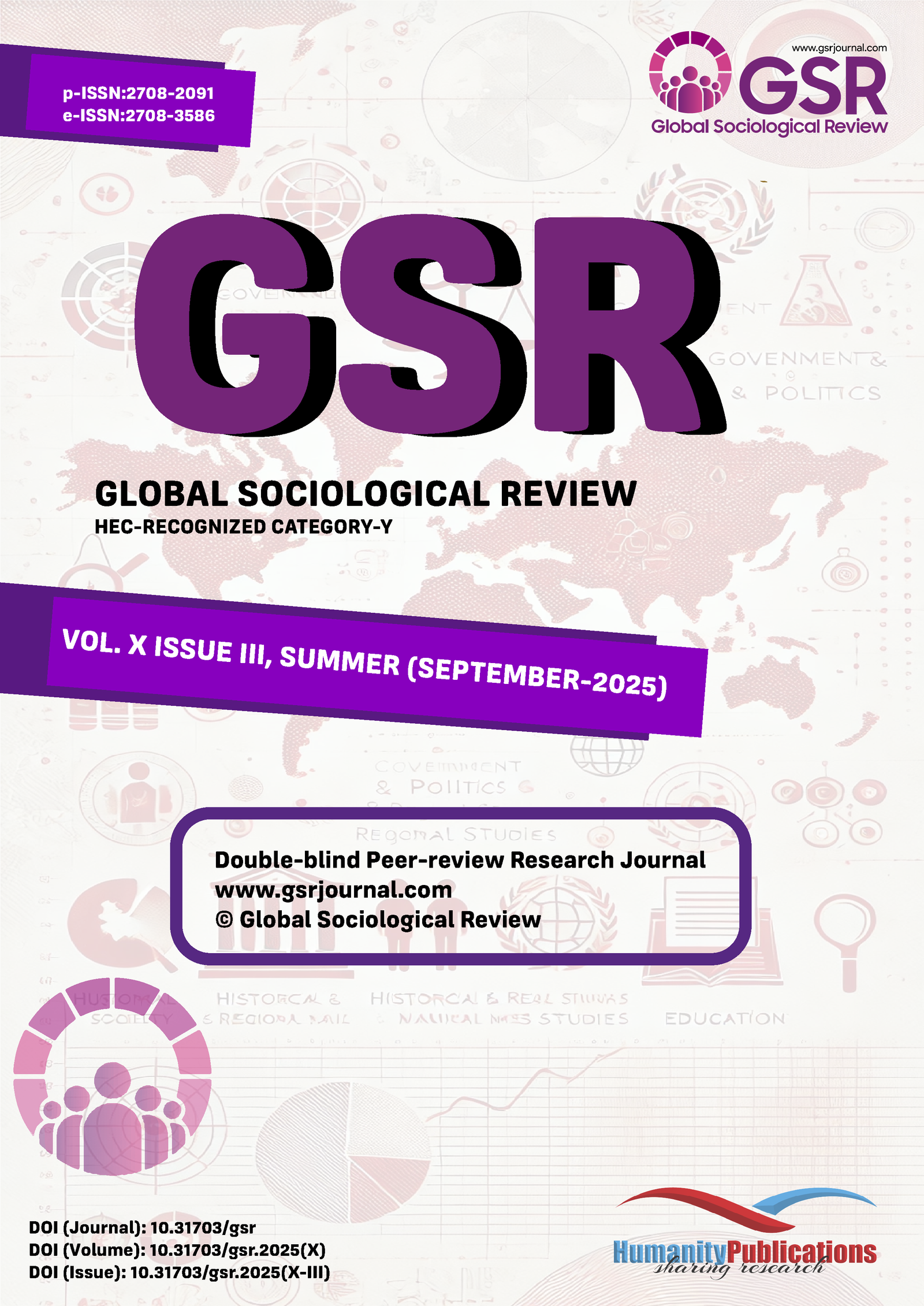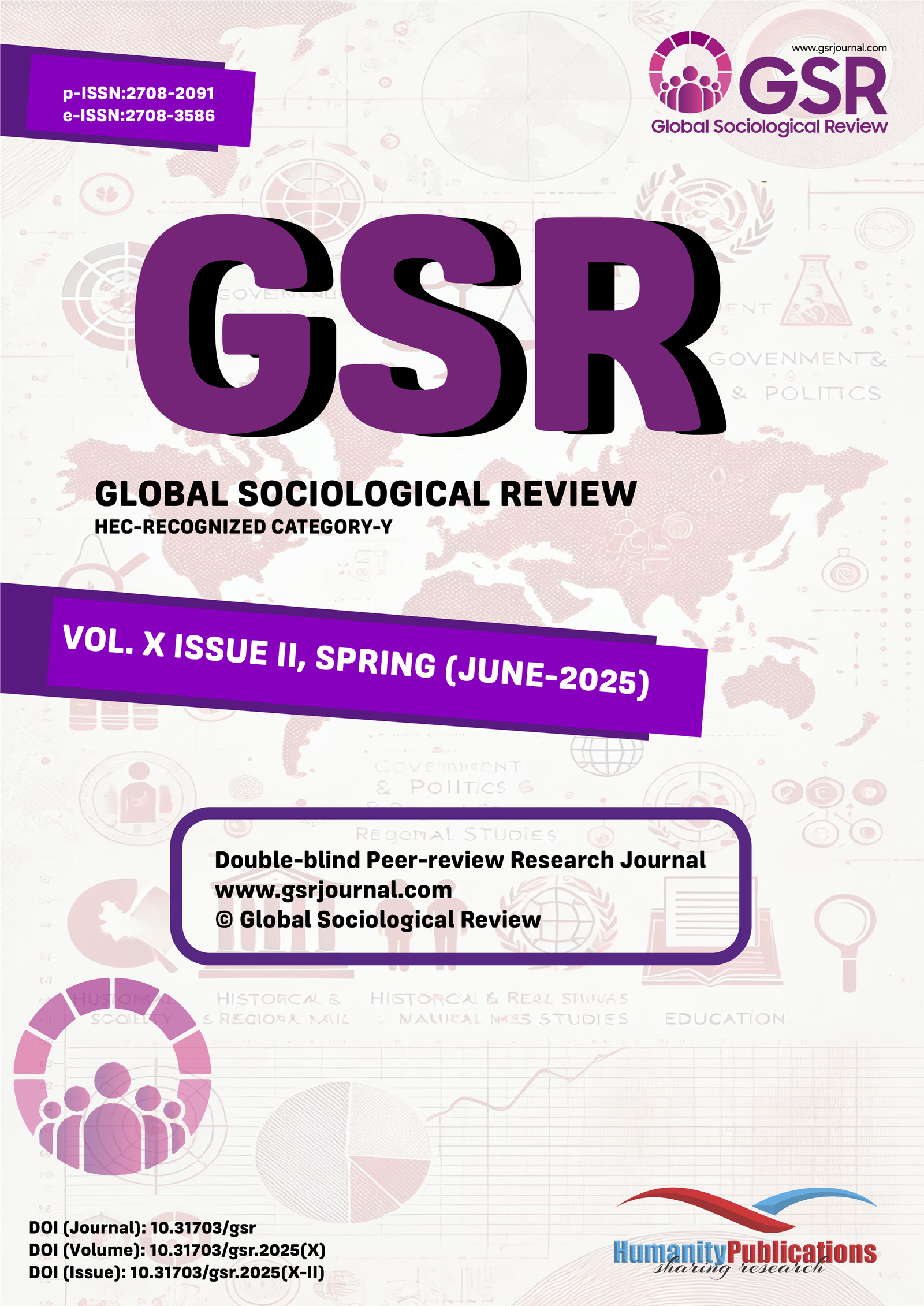01 - Role of State Feminism in Reducing Gender Lag: A Study of Pakistan...
http://dx.doi.org/10.31703/gsr.2021(VI-IV).0110.31703/gsr.2021(VI-IV).01 Published : Dec 2021
-
State is considered to be the custodian of rights of vulnerable segments like women. Neo liberal ideology advocates women's participation in the economic arena, yet it resists state role in the economic sphere for protection of the "second" gender. State role for protection of women is equally intolerable for the custodians of tradition. Ideology of state feminism believes that interest articulati... Details
-
State Feminism, Gender Disparities, Pakistan
-
(1) Rafida Nawaz
Assistant Professor, Department of International Relations, Bahauddin Zakariya University, Multan, Punjab, Pakistan.
(2) Syed Hussain Murtaza
PhD Scholar, Department of Political Science, Bahauddin Zakariya University, Multan, Punjab, Pakistan
(3) Muqarrab Akbar
Chairman, Department of Political Science, Bahauddin Zakariya University Multan, Punjab, Pakistan.
02 - Familial Aspects of Corruption: An Illustrative Approach Regarding Peshawar, Pak...
http://dx.doi.org/10.31703/gsr.2021(VI-IV).0210.31703/gsr.2021(VI-IV).02 Published : Dec 2021
-
The purpose of this research was to assess the familial aspects of corruption in district Peshawar,Pakistan. A sample size of 320 respondents out of 1872 was selected through a stratified random sampling technique.Gamma and chi-square tests were applied to determine the relationship between the dependent variable (perception of NAB paradigm for curbing corruption) and the independent variable (fam... Details
-
Corruption, Familial, NAB, Socialization, Corrupt Practices
-
(1) Bashir Muhammad
Ph.D. Scholar, Department of Rural Sociology, The University of Agriculture Peshawar, KP, Pakistan.
(2) Akhtar Ali
Assistant Professor, Department of Rural Sociology, The University of Agriculture Peshawar, KP, Pakistan.
(3) Muhammad Kaleem
Assistant Professor, Department of Sociology and Political Science. Bacha Khan University Charsadda, KP, Pakistan
03 - Social Attitudinal Differences towards English vs. Punjabi Language: A Study of ...
http://dx.doi.org/10.31703/gsr.2021(VI-IV).0310.31703/gsr.2021(VI-IV).03 Published : Dec 2021
-
This paper seeks to investigate the attitudes of globalized middle class parents towards English vs. Punjabi language in Faisalabad. Language is considered as a strong tool and identity marker both at an individual and societal level. Linguistically, Pakistan is a heterogeneous country where bilingualism is a very common phenomenon. However,these languages do not share equal position, prestige, an... Details
-
Attitudinal, Differences, English vs. Punjabi, Middle, Parents
-
(1) Mariya Javed
Lecturer, Faculty of English, Virtual University of Pakistan, Lahore, Punjab, Pakistan
(2) Rana Imran Ali
Lecturer, Faculty of English, Virtual University of Pakistan, Lahore, Punjab, Pakistan
(3) Zakia Aslam
Tutor/Instructor, Faculty of English, Virtual University of Pakistan, Lahore, Punjab, Pakistan
04 - Gender Inequality as a Barrier to Utilization of Services in Mother to Child Tra...
http://dx.doi.org/10.31703/gsr.2021(VI-IV).0410.31703/gsr.2021(VI-IV).04 Published : Dec 2021
-
This study examines gender inequality as a barrier to utilization of services in mother to child transmission of HIV/AIDS in Pakistan. The study uses a feminist approach to explore the barriers related to gender inequality during the uptake of HIV treatment. The data was collected from 26 medical practitioners and 10 HIV positive mothers through in-depth interviews. HIV positive mothers were found... Details
-
Gender Inequality, HIV/AIDS, Mother to Child Transmission, ART, VCCT
-
(1) Asma Zafar
Institute of Social and Cultural Studies, University of the Punjab, Lahore, Punjab, Pakistan
(2) Muhammad Ramzan
Assistant Professor, Institute of Social and Cultural Studies, University of the Punjab, Lahore, Punjab, Pakistan
(3) Ahmed Usman
Assistant Professor, Institute of Social and Cultural Studies, University of the Punjab, Lahore, Punjab, Pakistan
05 - Development of Creativity among Elementary Level Students of Low Socio-Economic ...
http://dx.doi.org/10.31703/gsr.2021(VI-IV).0510.31703/gsr.2021(VI-IV).05 Published : Dec 2021
-
Major aim was to determine the effect of guided inquiry on fluency and originality of ideas in creative thinking.The study was quasi-experimental. "Convenience" sampling technique was used. The sample size was 60. The experiment was performed in an elementary school in Islamabad. The scoring rubrics were used to analyze creative thinking in terms of fluency and originality. The scores of tests of ... Details
-
Creative Thinking, Fluency of Ideas in Creative Thinking, Originality of Ideas in Creative Thinking, Low Socio-economic background Science Classroom, Guided Inquiry, Elementary Level
-
(1) Sher Muhammad Awan
Assistant Professor, Faulty of Social Sciences and Humanities, Hamdard University Karachi, Islamabad Campus, Pakistan.
(2) Wajiha Kanwal
Assistant Professor (Education), University of Wah, Punjab, Pakistan.
(3) Arshad Mahmood Qamar
Lecturer (Science Education), Allama Iqbal Open University Islamabad, Pakistan.
06 - Effect of Personal-Networking and Social Exclusion on Social Well- Being among T...
http://dx.doi.org/10.31703/gsr.2021(VI-IV).0610.31703/gsr.2021(VI-IV).06 Published : Dec 2021
-
The present research was aimed to find the association between personal networking, social exclusion,and social well being among transgenders. Under the quantitative approach of study, the correlational design of there search was employed to evaluate the affiliation amid personal networking and social well being. Systematic sampling techniques and strategy were used to collect data of 350 transgen... Details
-
Personal Networking, Transgender, Social Exclusion, Social Wellbeing, Policies, Social Networking
-
(1) Muhammad Faisal Majeed
Department of Sociology, Institute of Social and Cultural Studies University of Punjab, Punjab, Pakistan.
(2) Farhan Navid Yousaf
Department of Sociology, Institute of Social and Cultural Studies University of Punjab, Punjab, Pakistan.

(1).png) Volume XI, Issue I (Winter 2026)
Volume XI, Issue I (Winter 2026)  Volume X, Issue IV (Fall 2025)
Volume X, Issue IV (Fall 2025)  Volume X, Issue III (Summer 2025)
Volume X, Issue III (Summer 2025)  Volume X, Issue II (Spring 2025)
Volume X, Issue II (Spring 2025)  Volume X, Issue I (Winter 2025)
Volume X, Issue I (Winter 2025)  Volume IX, Issue IV (Fall 2024)
Volume IX, Issue IV (Fall 2024)  Volume IX, Issue III (Summer 2024)
Volume IX, Issue III (Summer 2024)  Volume IX, Issue II (Spring 2024)
Volume IX, Issue II (Spring 2024)  Volume IX, Issue I (Winter 2024)
Volume IX, Issue I (Winter 2024)  Volume VIII, Issue IV (Fall 2023)
Volume VIII, Issue IV (Fall 2023)  Volume VIII, Issue III (Summer 2023)
Volume VIII, Issue III (Summer 2023)  Volume VIII, Issue II (Spring 2023)
Volume VIII, Issue II (Spring 2023)  Volume VIII, Issue I (Winter 2023)
Volume VIII, Issue I (Winter 2023)  Volume VII, Issue IV (Fall 2022)
Volume VII, Issue IV (Fall 2022)  Volume V, Issue IV (Fall 2020)
Volume V, Issue IV (Fall 2020)  Volume V, Issue III (Summer 2020)
Volume V, Issue III (Summer 2020)  Volume V, Issue II (Spring 2020)
Volume V, Issue II (Spring 2020)  Volume V, Issue I (Winter 2020)
Volume V, Issue I (Winter 2020)  Volume IV, Issue I (Fall 2019)
Volume IV, Issue I (Fall 2019)  Volume III, Issue I (Fall 2018)
Volume III, Issue I (Fall 2018)  Volume II, Issue I (Fall 2017)
Volume II, Issue I (Fall 2017)  Volume I, Issue I (Fall 2016)
Volume I, Issue I (Fall 2016)